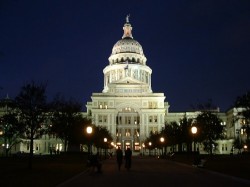
Texas Adds Over 700,000 Jobs
Winners and Losers
Private-sector job growth, aside from Texas, has been greatest in Arizona, Utah, North Dakota, Washington, and Virginia. But none of the states has managed to even top 100,000 new jobs over the 10 years from 2001 through 2011. The worst losses, outside of California, have been in Michigan (619,000), Ohio (460,000), and Illinois (363,000).
The Golden State was once a powerhouse for job creation, home to world-leading companies like Google and Oracle. But now Chief Executive magazine has ranked California the worst state to do business in for the last seven years. No prizes for guessing which state is ranked #1 for the same period.
California has the second-highest taxes in America (and again, Texas has the second lowest). California burdens businesses with highly restrictive regulations, has bloated government payrolls, public-sector unions that have been promised absurd levels of benefits, and a government that is positively hostile to private-sector employers. Texas has no state income tax; in 2009 California was issuing IOUs in lieu of refunds to taxpayers. Small wonder that every year about 100,000 more people leave the state than come in (legal residents, that is). Texas gains 150,000 new (legal) residents every year.
Texas is the polar opposite, rated by the 550 CEOs voting in the Chief Executive survey as having the highest labor market flexibility, weak unions, and a small government. The state gets low marks on its education system but California’s schools were labeled “A lesson in mediocrity” by The Economist magazine.
Home of The Unemployed
 The Winning Formula
The Winning Formula
Writing in The Washington Examiner, Michael Barone puts it this way: “if you take a previously prosperous and creative state and subject it to high taxes and intrusive regulations, it loses 5% of its private sector jobs; if you take a previously somewhat less prosperous and creative state and govern it with low taxes and light regulation, it gains 9% more jobs, even as the nation’s economy is suffering.”
The states that are adding jobs — Arizona, Utah, North Dakota — all follow the Texas formula to a large degree: low taxes and a business-friendly environment. But this is a lesson that’s not easily learned, as demonstrated by the recent antics of the California legislature. The Business Roundtable estimates that the state’s new carbon emissions law will result in over half-a-million jobs foregone this year as businesses choose to locate elsewhere.
Need further proof that Texas is where the action is now? TNT is bringing back Dallas.